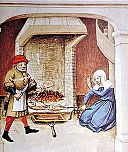
Medieval cuisine includes the foods, diets, and cooking methods of various European cultures from the 5th to the 15th century. Cereals were the most important staple during the Early Middle Ages: barley, oats, and rye were eaten by the poor while wheat was generally more expensive. These were consumed as bread, porridge, gruel, and pasta by people of all classes. Cheese, fruits, and vegetables were important supplements. Meat, including pork, chicken, and other domestic fowl, was more expensive, and game was common only on the nobility's tables. Many freshwater and saltwater fish were also eaten; in the north, cod and herring were mainstays. In contrast to the exotic spices and expensive imported food of the nobility, working-class food was less refined, as mandated by decrees and social norms. A highly spiced sweet-sour food repertory developed among the upper classes in the Late Middle Ages. (Full article...)